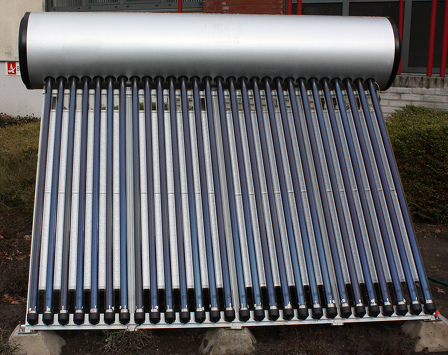I have been working on a project to build a zero fossil fuel farm and community called Living Energy Farm. Our intention is to create a farm and a community that uses no gasoline, no diesel, and no grid electricity. The project is being built inexpensively so that people may live comfortably, support themselves economically, and do so in a manner that is easily replicated by others.
Building a zero fossil fuel community requires that we reassess our understanding of technology. Our society has a fascination with technology. Whether it is fueled by fossil fuel or renewable energy, we tend to look toward magic machines to come save us. The reality is social organization is far more important than machines. Or to say that differently, using resources cooperatively is what makes renewable energy work. Trying to fuel the rapacious consumer economy with renewable energy is only going to do more harm than good.
Human cultures evolve around their core economic institutions. Our economy needs a labor force that is specialized, technically capable, and mobile. Not coincidentally, the extended families of yesteryear have broken down, and now small families and individuals living alone are now the norm. Fossil fuel is, for better or worse, highly concentrated energy. It fits well with our highly specialized, individualized society. Small, simple machines can use concentrated fossil energy and heat water for your shower, cook your dinner and toast your bread.
Renewable energy is, by contrast, dispersed and intermittent. The sun shines all over, but not always, and converting it to heat and mechanical power requires devices that are larger and more expensive than a toaster. A solar water heating system is larger and (if it's a good one) more expensive than an electric water heater. There is plenty of sun, wind, wood, and wheat straw, but such renewable resources are not always where and when we want to use it.
Cooperative use makes up for the weaknesses of renewable energy. Every energy source, every technology, has an optimal scale. It is no coincidence that the age of huge centralized factories, supported by resources transported a great distance, is also the age of cheap, abundant fossil fuel. The optimal scale for renewable energy, in most cases, is the extended family or community scale. Specifically, to build a solar water heating system that reliably produces and stores hot water for a family of three in the current economy would cost a few thousand dollars. To build a solar hot water system for a dozen people would cost only a fraction more. I have built a number of these systems, and the math really starts to do magic with cooperative use. The cost of the system is divided among more users, and the savings multiply.
In other cases, very simple, effective renewable technologies simply do not work at all in the individualized, commuter culture, but work great on a village level. Solar cooking is one example. Solar cookers are simple devices. Solar ovens are simply an insulated boxes with glass over the front, and some reflectors mounted to bring in a bit more heat. Solar parabolic cookers are even simpler. If you imagine a satellite dish with tin foil on it, you get the idea. At Living Energy Farm (LEF), we refer to our parabolic cooker affectionately as the "death ray." That's because you can put a stick in front of it and it will burst into flame in about three seconds. (In all fairness, I should say that LEF is not “my” project. I am one member of a larger group working on the project. My interpretations of its meaning are simply that, mine.)
On a sunny day, cooking food on a parabolic cooker is about as easy and fast as a gas stove. One a farm, or in a village, where one person can cook for other people, solar cooking is easy, an ideal use of renewable energy. It couldn't be easier, or more sustainable. But when millions of people commute to go work in their cubicles, then the way we are organized socially defeats renewable energy. I have heard many complex schemes to gather sunshine in a desert far way, or biofuel from somewhere, to feed centralized energy systems that cook the food for the cubicle workers. But the complexity and expense of centralized versus village-level energy systems could not be more extreme.
Is solar cooking a big issue? The entire local food movement is based on the idea that it is environmentally beneficial to reduce the excessive "food miles" traveled by the food on your dinner plate as it moves from industrial farms to your home. Fair enough. But Lester Brown also points out that American kitchens use more energy than American farms, and that American refrigerators use more energy than all the tractors on our farms.[1] Cooperative use makes solar cooking viable. The potential carbon savings from community kitchens is thus enormous.
Nowhere are appropriate scaling and community use more important than in the area of biofuel. Another word for biofuel is forest. Forests become biofuel by being labeled a “green” energy source and burned instead of coal (as is happening in my home state of VA). Forests also become biofuel by being displaced by biofuel farms, as is happening all over the world, especially in the tropics. Biodiesel and ethanol have been the primary focus of the biofuel revival that started in the early 2000s. This is because these fuels are well suited to the commuter society. Commuters can, in theory, fill their tanks with biodiesel or ethanol-gasoline mixes and continue on business as usual. The problem, as it was soon recognized, is that food-based biofuels trigger food price spikes. The direct impact on world hunger has been significant. For years the number of hungry people in the world fell. With the first food price spike about 7 years ago, world hunger turned upward to over a billion people. Prices fell, though not to their previous level, and have now risen again. The most dire prediction made by myself and others was that the poorer nations of the world would be pressured to give up their land for biofuel production. In this century, about 5% of the continent of Africa has been sold to foreign corporations for food and biofuel production.[2]
The modern biofuel renaissance is, among other things, a stark example of our self-imposed ecological/ cultural illiteracy. We think technology in magical terms. The reality is that technology, historically at least, has been driven by depletion. We always use the easiest, best resources first. As those resources become depleted, we turn to resources that are inferior, harder to get, require more processing to make a useful product. Our predecessors used animal skins as clothing. When there weren't enough animal skins to go around, they turned to wool. It took longer, more work, to produce an inferior product. Then they turned to cotton. Still more work to produce an inferior product. In modern times, we have turned to synthetics. Ever more complex technology and higher energy inputs are needed to make up for depletion. (The most concise explanation of the relationship of depletion and technological change is a remarkable but little-known book entitled Poverty and Progress by Richard Wilkinson.)
The same pattern has played out with biofuel. The early industrial revolution was entirely biofueled. Wood is easier to gather, and burns cleaner, than coal. As a result, Europe was largely deforested by the mid seventeenth century. Even though the early United States had enormous volumes of resources at its disposal, the same pattern played out here as well. By the mid nineteenth century, firewood was becoming depleted and thus wood became so expensive that the transition to coal was made.
Europe hit the limits of the biofuel economy over 300 years ago. The United States did so over 150 years ago. Modern calculations indicate that, in the United States, we are currently using 25% more energy than the entire photosynthetic product of the land on which we live. In other words, even if we burned all of our grain, every leaf from every tree in the forest, we would still fall well short of how much energy we currently use, and we would be terribly hungry.[3] The idea that we can turn back the clock and fuel the modern economy with biofuel is a profound display of our own self-imposed cultural illiteracy. Every human culture, at least in the social realm, knows what it chooses to know and does not know what it chooses to not know. We have chosen to not know our own ecological history. We have forests in America because we are not burning them for fuel. We cannot go back to a biofuel economy.
Having said all that, the reality is that our long-term future will be entirely biofueled, as fossil fuels are finite. The difference between disaster and sustainability will be made by appropriate scaling and cooperative use. If we design our lifestyles, our lives, around what is truly sustainable, taking advantage of the strengths of renewable energy while compensating for their weaknesses, then the mechanical questions of how we support ourselves in a sustainable economy are simple. If we assume the current lifestyles will remain in place, then trying to turn back the clock to an age of biofuels will only hasten our decline to a denuded and polarized world.
At LEF, we are using some old technologies, mixed with new technologies, to try to find the right mix that is suitable for a village-level economy. We are using woodgas, a technology widely used in WWII to run gasoline engines on woodchips. Our use of woodgas is restricted to the farm. It is not allowed for over-the-road use. We use some firewood as well, though very little as our buildings are well insulated.
For cooking, we also have biogas at LEF. That is a technology that has been widely used in villages in China and other parts of the "less developed" world. We mix old and new machines to try to find the right balance for sustainable, community use. We have some modern, very efficient water pumps, as well as some hundred year old ones. The new ones work very nicely, but they are black boxes, We can't fix them if they break. The old pumps work too, if not quite as efficiently, and are rebuildable indefinitely. Most of the technologies we use are all simple. They require maintenance, feeding and tinkering. They work well for an extended family, a close community, or a village. Renewable energy technologies are inherently poorly suited to suburban, cubicle America.
At LEF, we have solar heated buildings. The designs are simple and cheap, though far different from the norm, even among solar buildings, in the United States, quite a few people tried to build solar houses back in the 1970s and 1980s. There were several limitations that crippled the movement. Houses in the U. S. are not based on any rational plan, but rather foolish traditions. People all over the world have built hovels and shacks, with their feet and their floors on the ground. Then our societies became highly stratified, and the princes and princesses started building mansions, big houses that reached up into the air. They wanted to differentiate themselves from the slovenly masses, and you can't build mansions out of mud and straw so easily, so they built thin-walled structures out of wood. Along comes industrialism, everyone in the industrial world gets richer and wants to look like princes and princesses. The norm for our housing thus became the thin-walled mansion. Then we added furnaces and thermostats that suck enormous volumes of energy into these thin-walled palaces.
Along comes the solar revival of the late 20th century, and they tried to heat thin-walled houses to a thermostatic standard. They built expensive solar systems, tried to store the heat in tanks and rock beds, and blow it back into the house later on. The whole proposal simply proved itself prohibitive for a single family household, let alone a sole apartment dweller.
At LEF, we build thick-walled structures that sit on the ground. Strawbale is my favorite, but there are many other methods. We use thermal mass (aka dirt) to store energy rather than water tanks, rock beds, or batteries. We use solar pumped irrigation water to cool the houses. Free air-conditioning, more or less. The “technologies” we use are simple and cheap.
Karl Wittfogel pointed out some decades ago that early civilizations that developed in river valleys had more oppressive governments than those which fed themselves with rainfall agriculture.[4] Wittfogel coined the term "hydraulic societies" to refer to civilizations where the king had the power to cut off the water supply to unruly provinces. It is little more than educated intuition to note that a centralization of economic power supports a centralization of political power. The inverse is true as well, decentralized economic power supports decentralized political power. In a word, democracy.
In our time, we have developed a hydraulic force far more powerful than that of any previous irrigation-based society, and that is highly technological production processes controlled by corporations. Even in the most oppressive ancient civilizations, every peasant knew how to plant, how to farm, how to make their own clothing and build their own shelter. Now our food is industrial. Our energy is pumped out of the ground by machines of unfathomable complexity. Our clothing, our shelter, our transportation, everything we need to survive, is the product of an industrial mega-corporation. It is spurious to speak of freedom when the very cells of our being are fed by corporations. We will have as much freedom for as long as it is profitable. The hydraulic power of modern technology exceeds that of the ancient irrigation-based despotisms. Our self-imposed cultural illiteracy is the deep root of the modern environmental crisis. It is also putting in to place the building blocks of our future enslavement. We are capable of understanding our own cultural evolution, and guiding it consciously. That will involve more than reading books. It will involve getting your hands dirty.
Our social movements have become myopic in the extreme. We tend to see social issues — civil liberty, fair pay, gay rights, women's rights, etc — as somehow different from ecological "issues." They are not. We cannot have a democratic society on top of a crumbling ecological foundation. Solving our ecological problems is not that difficult, at least from a mechanical perspective. If only we would actually try to solve them. We are not.
The reality is that most people in the world live fairly sustainably because they cannot afford to do otherwise. Most of the ordinary people in the world live modestly in villages and extended families. In the United States, we are much wealthier. The primary impact of American environmentalism is not real sustainability, but rather to make people feel better about our individuated consumer society. We like the idea of new technologies. Conservatives want to build nuclear or clean up fossil fuel technologies. Liberals want to pretend we can power the economy with windmills. None of them want to admit that no new technology, no matter how sophisticated or efficient, can ever make up for a lack of modesty or good sense. If we are determined to consume like mad, drive all over the place, live in spacious private houses, and eat every animal that walks, crawls or flies, on land, in the air or at sea, no magic technology can ever make up for that. You cannot drive at 100 miles per hour toward a brick wall and expect a magic technology to save you from your own stupidity. You cannot put a gun to the head of the next generation and expect a magic technology to stop the bullet. But that is what we are doing. Greening our thin-walled, sparsely inhabited mansions, putting grid-tied solar panels on the rooftops and a hybrid car in the driveway will not stop the bullet that we have pointed at the next generation. It may make us feel better for a while. The the laws of physics don't care how we feel.
It all begs the question of why we are so greedy and short-sighted in the first place. As absurd as it may sound, the truth is that we have never undertaken any systematic or scientific effort to understand the real causes or real solutions to the great calamity we are facing. I have collected piles of environmental books. I suppose I am not the only one with such a predilection. The assemblage of information from around the world in many such books is quite impressive. But that basic question as to why we have an environmental crisis in the first place is has never been investigated. Some people point a finger at population growth. Liberals and conservatives alike bemoan the Malthusian pressures at the base of the ecological crisis. Never mind that there is no scientific basis for such assumptions.
Others point to “human nature,” our natural tendency to be greedy and selfish that supposedly lies at the base of all this cannibalism of future generations. Our technology has allowed us to consume future generations in a most moral and dignified manner, keeping our white shirts spotless in the process. But there is nothing natural, or human, about despoiling the entirety of creation.
The final critical ingredient to a sustainable future is a science of culture. Or perhaps we should just call it basic cultural literacy. Every human culture chooses to know what it wants to know about its own social evolution, and chooses to not know what it does not want to know. We can build space ships and computers, but we don't have clue why men dominate women, why some human societies have stratified and others have not, why some human societies have been sustainable and others have not. We do not know because we have chosen not to know. We could choose to know. We could choose to use renewable energy in a context in which it actually works. We could choose to be happy and live well, in reasonable equity with the other peoples of the world.
Notes
[1] Brown, Lester, Plan B 2.0; Rescuing a Planet Under Stress and a Civilization in Trouble, Norton, NY NY, 2006, p.28
[2] Damian Carrington and Stefano Valentino, “Biofuels boom in Africa as British firms lead rush on
land for plantations,” The Guardian, May 31, 2011,
www.guardian.co.uk/environment/2011/may/31/biofuel-plantations-africa-british-firms; Katie Allen, “Friends of the Earth urges end to ‘land grab’ for biofuels,” The Guardian, August 29, 2010,
www.guardian.co.uk/environment/2010/aug/30/biofuels-land-grab-friends-of-the-earth.
[3] Pimentel and Pimentel, eds., Food, Energy, And Society; David Pimentel and Marcia Pimentel, “Land, Energy and Water: The Constraints Governing Ideal U.S. Population Size,” NPG Forum, npg.org; Charles A. S. Hall and Kent A. Klitgaard, Energy and the Wealth of Nations: Understanding the Biophysical Economy (New York: Springer, 2011).
See www.esf.edu/EFB/hall; see a discussion of Hall’s findings with a helpful graph at
www.theoildrum.com/node/3412. See also Hall and Klitgaard, Energy and the Wealth of Nations
[4] Wittfogel, Karl A., Agriculture, A Key to Understanding Chinese Society Past and Present, Canberra, Australian National University Press, 1970.
* * *
Check out Alexis Zeigler's new book, Integrated Activism: Applying the Hidden Connections between Ecology, Economics, Politics, and Social Progress. Now available from Evolver Editions/North Atlantic Books!
Image by gmourits, courtesy of Creative Commons license.










